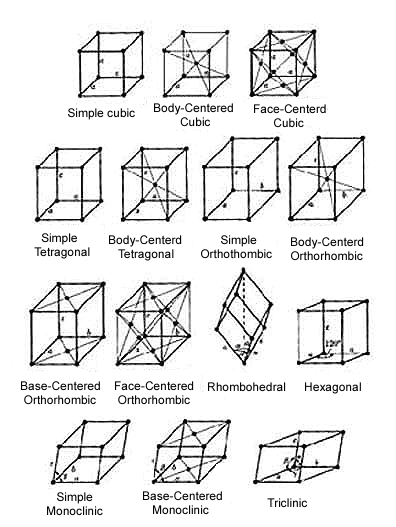The Seven Crystal Systems
- What are the seven crystal systems?
There are 7 systems, through which crystals can be classified by analyzing their atomic structure or lattice; atomic structure or lattice is known to be the network of three-dimensional placed atoms that are particularly arranged by a pattern symmetrically. For determining the crystal system the shape of lattice structure will be classified according to their appearance and physical properties for identifying the stone belongingness. In the practice of crystal healing, the crystal’s axial symmetry is majorly influenced by metaphysical properties directly. For instance, cubic system crystals are majorly believed to exist in the grounding of the earth. because the cube is simply known to be the symbol of the earth element (Acevedo, 2015).
Tetragonal
For the analysis of the Tetragonal system, the two equal length axes are required in the same plane, with a longer or shorter main axis. Also, the rest of the three right-angle intersects will be required. Based on the inner rectangular structure shape of the crystal can include a prism with four sides, a double or 8 sided pyramid, hexacisochedron, trapezohedrons, and Icosi-tetrahedron.
Orthorhombic
All the three-axis will have different lengths combining at each other’s right angles. Based on the inner structure of the rhombic shape, crystals include rhombic prisms, double pyramids, and pinacoids.
Trigonal
The angles and axis will be similar to the hexagonal system. The cross-section 2 system will be combined with a hexagonal crystal with 6 sides. Hexagonal
Monoclinic
Characterized by having only mirror plane(s) or a single 2-fold axis.
The resultant lattice will consist of an ordered stacking of blocks, or unit cells, if the atoms or atom groups in the solid are represented by points and the points are linked. The monoclinic unit cell may be rotated by 180 degrees along a single axis, known as an axis of twofold symmetry, without the cell's appearance altering. The monoclinic system is home to more solids than any other. The monoclinic system is used for the crystallization of beta-sulfur, gypsum, borax, orthoclase, kaolin, muscovite, clinoamphibole, clinopyroxene, jadeite, azurite, and spodumene.
Triclinic
All of the three-axis will be inclined with different lengths towards each other. Three axes with different lengths and nonorthogonal (nonperpendicular) degrees of inclination.
If the atoms or atom groups in the solid are represented by points and the points are linked, the resultant lattice will be made up of a neatly stacked arrangement of units, or cells. The form of the triclinic unit cell is the least symmetrical of all unit cells. In the triclinic system, crystals of turquoise and other minerals, including microcline, form.
Isometric or Cubic System
It can be analyzed through to their three-axis with properties of a right angle intersect with equal length. Based on the inner structure of the square the shape of the crystal includes Octahedron, cube, Icosi-tetrahedron, Rhombic dodecahedron, and Hexacisochedron (Song, 2012).
| Crystal System | Diagram | Example |
|---|---|---|
|
Cubic a = b = c; α = β = γ = 90° |
 |
 Pyrite |
|
Tetragonal a = b ≠ c; α = β = γ = 90° |
 |
 Wulfenite |
|
Orthorhombic a ≠ b ≠ c; α = β = γ = 90° |
 |
 Aragonite |
|
Monoclinic a ≠ b ≠ c; α ≠ 90° = β = γ |
 |
 Azurite |
|
Rhombohedral a = b = c; α = β = γ ≠ 90° |
 |
 Calcite |
|
Triclinic a ≠ b ≠ c; α ≠ β ≠ γ ≠ 90° |
 |
 Microcline |
|
Hexagonal a = b ≠ c; α = β = 90°, γ = 120° |
 |
 Beryl |
Unit Cells
Summary
- A crystal is a substance in which the particles are arranged in an orderly, repeating, three-dimensional pattern.
- The crystal lattice is the three-dimensional arrangement of a solid crystal.
References
Acevedo, N. C., & Marangoni, A. G. (2015). Nanostructured fat crystal systems. Annual review of food science and technology, 6, 71-96.
Song, P., Cao, H., Wang, F., Ellahi, M., & Yang, H. (2012). Study of polymer-dispersed liquid crystal systems using epoxies/acrylates as hybrid polymer matrix components. Liquid Crystals, 39(8), 903-909.


2 comments
This is very informative!
This is very informative!